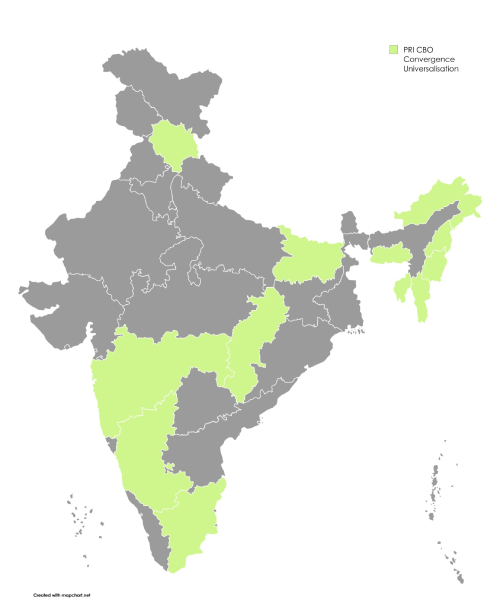Univeralisation
In 2012, the Ministry of Rural Development, Government of India, recognized Kudumbashree as a National Resource Organisation (NRO) under the National Rural Livelihood Mission.
As an NRO, Kudumbashree partnered with State Rural Livelihood Missions (SRLMs) to provide technical and implementation support for Implementing PRI CBO Convergence project. Between 2013 and 2022, Kudumbashree NRO supported fifteen states in implementing PRI-CBO Convergence across 66 districts,115 blocks, and 2092 Local Self Government Institutions.
The PRI-CBO Convergence model was designed to partner Community-Based Organizations with Local Governments to enhance community participation in local governance and make local planning more democratic. This was achieved through various means, including creating local resource pools, establishing institutional platforms, generating awareness on schemes and entitlements, improving Panchayat governance, and empowering women to participate in local elections.
Recognizing the impact of these convergence pilots, the Secretary of the Ministry of Rural Development instructed Kudumbashree NRO to prepare a strategy for a universal rollout of the PRI-CBO Convergence model. MoRD asked NRO to submit the implementation strategy and subsequently approved the national rollout strategy of the project. From the partner states 10-25% of the total blocks has been initiated universalisation of the project in the initial phase. The states selected the resource blocks, National Rural Economic Transformation Project (NRETP), and NRLM Model CLF blocks for the implementation in the first phase. The states also earmarked funds for the implementation of the project from FY 2022-23 onwards.
Under Universalisation, Kudumbashree NRO will collaborate with concerned State Rural Livelihood Missions (SRLMs) as a knowledge partner, offering technical support for capacity building to states and consultation for policy decisions and implementation respectively. The project will be implemented and facilitated by the IBCB -SISD team of DAY NRLM and SRLMs.
Immersion Block development is a focus area of Universalisation where NRO will develop the selected block as models of convergence to demonstrate these blocks as references for other blocks and districts when the states will be implementing the project on their own.
The PRI-CBO Convergence Universalisation Project has been rolled out in 12 states, with scoping studies completed in 7 additional states to assess readiness and lay the groundwork for implementation.

Coverage.
| Sl.
No |
State | Districts | Blocks | Panchayats/Villages | Immersion Blocks | No. of DRPs | No. of BRPs | No. of LRPs | No. of Mentors |
|---|---|---|---|---|---|---|---|---|---|
| 1 | Arunachal Pradesh | 14 | 25 | 567 | 4 | – | 25 | 542 | 4 |
| 2 | Chhattisgarh | 2 | 8 | 200 | 2 | 2 | – | 200 | 2 |
| 3 | Himachal Pradesh | 3 | 4 | 148 | 2 | 3 | – | 340 | 2 |
| 4 | Karnataka | 8 | 34 | 804 | 2 | – | 34 | 1608 | 2 |
| 5 | Manipur | 7 | 20 | 254 | 2 | – | 27 | 485 | 2 |
| 6 | Meghalaya | 12 | 40 | 3567 | 4 | – | 40 | 2644 | 4 |
| 7 | Mizoram | 7 | 15 | 302 | 2 | 15 | – | 332 | 4 |
| 8 | Maharashtra | 12 | 24 | 1922 | 4 | 12 | 24 | 1912 | 4 |
| 9 | Nagaland | 4 | 8 | 102 | 3 | 8 | – | 120 | 3 |
| 10 | Puducherry | 2 | 3 | 108 | 1 | – | 3 | 0 | 1 |
| 11 | Tamil Nadu | 6 | 75 | 1963 | 6 | 6 | 75 | 3926 | 3 |
| 12 | Tripura | 5 | 28 | 480 | 3 | 14 | – | 604 | 3 |
| 13 | Total | 82 | 284 | 7779 | 35 | 60 | 228 | 12713 | 34 |
